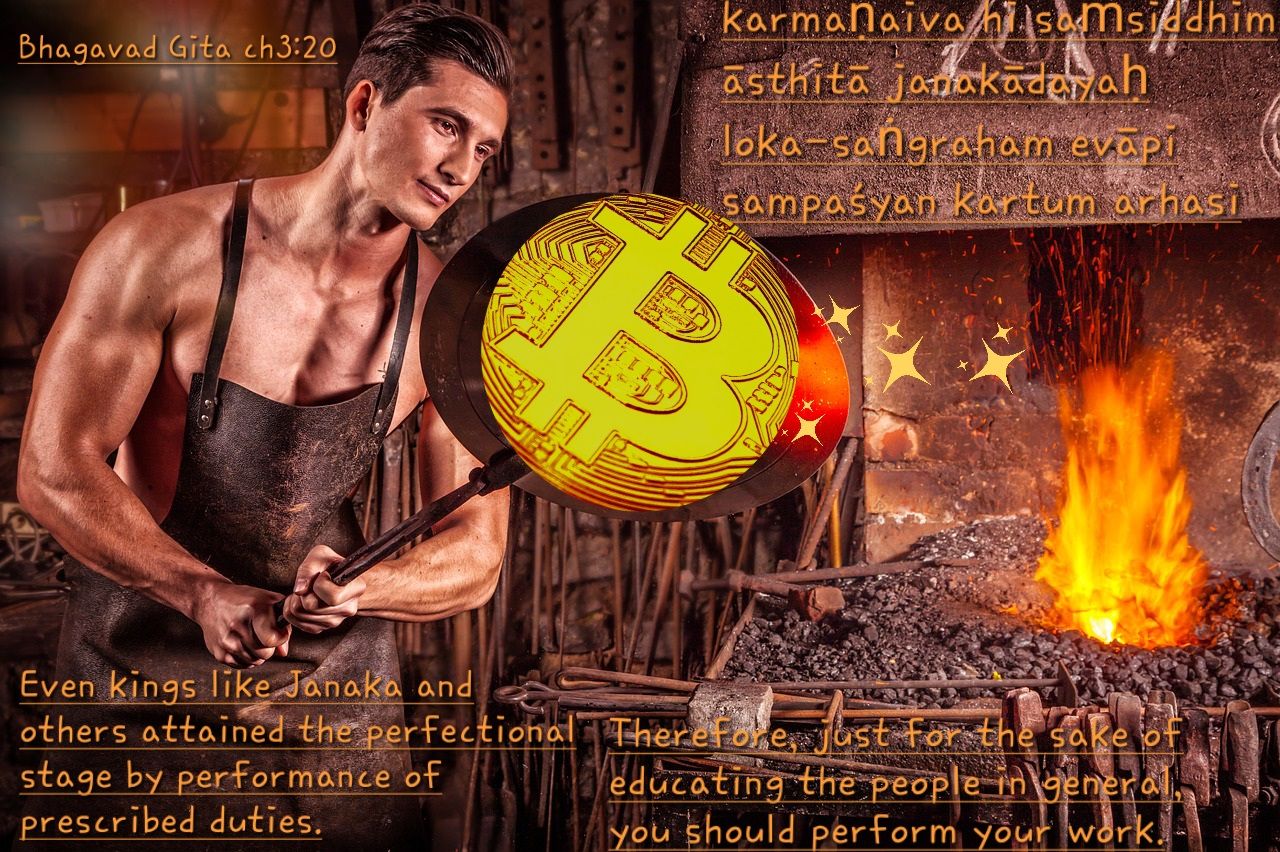Some people are so fortunate that they have don't need to work to survive. They have enough money to live like a king, due to whatever reason.

And yet they continue to work because they have a healthy work ethic. They care more about the work than the money it brings. Perhaps they want to uplift society in some way so they engage in their duty for philanthropic reasons.
The truly noble of spirit will work out of a propensity to be of service to humanity, and they set an example of judicious use of their limited time available in this life.
Today the richest man in the world, Elon Musk, is worth more than the gdp of his entire nation of birth - South Africa. He has enough money to last several lifetimes and need never work another day and still be able to buy anything.
Yet he works tirelessly, seven days a week, running multiple companies and achieving phenomenal output, building products to uplift society.
In the ancient Vedic kingdom of Lord Rama, the original hero and icon of Indian history, the father of Queen Sita - Rama's wife and consort - was himself a liberated soul who had no need to work ever again. Yet he continued to administer the kingdom in order to set the example and educate the citizens of his kingdom.
The rule of King Rama is to this day still regarded as that of an ideal king, and called "Rama rajya". Such heros of past and present continue to perform their duty and work hard in order to set the example for the rest of us.
This example is ideal for the seeker of enlightenment. In the pursuit of freedom from the miseries and hard struggle of material existence, we may turn our backs on material life, renouncing it for the sake of spiritual pursuits or liberation from the cycle of repeated birth and death.
However, as long as one is in the body, the senses will push us to act. We cannot artificially try to cease action. Or even if you can cease material pursuits, due to skill in meditation, or simply a strong enough aversion for material existence, still early retirement is not the wisest choice.
Nor is it going to be of greatest service to society to simply walk away. Rather, the ancient Wisdom advises one to persevere with one's duty, to work and engage the senses while still able because your action will set the best example for others to follow.
This human life is an opportunity to not only gain benefit for yourself, material or spiritual, but also a chance to use your body and the energy available to make a valuable contribution to society, or even just among your circle of influence.
Better than material pursuit may be the Transcendence of material objects. Yet better than simply renouncing material energy is to harness every ounce of energy available to you for the sake of uplifting society and the world around you.
And better than merely providing a better space ship or electric car for a more efficient material life, is providing the facility for Transcendence or liberation for humanity.
The space rocket may liberate one from earth's gravity, but the practice of yoga and education of the masses in the goal of yoga, may liberate one from repeated birth on earth, lifetime after lifetime.
Either way, whether for one's own personal benefit, or more so for the benefit of those less fortunate, one should use this life to work hard, engage the material energy, yet do it with the ultimate goal in mind - Transcendence or liberation.
To walk away from the world in the hope of liberating oneself is noteworthy, yet what is truly noble is to stay on the battlefield, in the trenches, and set the example for the rest of us who are struggling far worse to survive. By doing that you not only liberate yourself, but you also take a many others as possible along with you.
Bhagavad Gita ch3:20
karmaṇaiva hi saṁsiddhim
āsthitā janakādayaḥ
loka-saṅgraham evāpi
sampaśyan kartum arhasi
SYNONYMS
karmaṇā—by work; eva—even; hi—certainly; saṁsiddhim—perfection; āsthitāḥ—situated; janaka-ādayaḥ—kings like Janaka and others; loka-saṅgraham—educating the people in general; eva—also; api—for the sake of; sampaśyan—by considering; kartum—to act; arhasi—deserve.
TRANSLATION
Even kings like Janaka and others attained the perfectional stage by performance of prescribed duties. Therefore, just for the sake of educating the people in general, you should perform your work.
PURPORT
Kings like Janaka and others were all self-realized souls; consequently they had no obligation to perform the prescribed duties in the Vedas. Nonetheless they performed all prescribed activities just to set examples for the people in general. Janaka was the father of Sītā, and father-in-law of Lord Śrī Rāma. Being a great devotee of the Lord, he was transcendentally situated, but because he was the King of Mithila (a subdivision of Behar province in India), he had to teach his subjects how to fight righteously in battle. He and his subjects fought to teach people in general that violence is also necessary in a situation where good arguments fail. Before the Battle of Kurukṣetra, every effort was made to avoid the war, even by the Supreme Personality of Godhead, but the other party was determined to fight. So for such a right cause, there is a necessity for fighting. Although one who is situated in Kṛṣṇa consciousness may not have any interest in the world, he still works to teach the public how to live and how to act. Experienced persons in Kṛṣṇa consciousness can act in such a way that others will follow, and this is explained in the following verse.
Reference: Bhagavad Gita As It Is, translation and commentary by Swami A C Bhaktivedanta, original 2972 MacMillan edition, freely available at prabhupadabooks.com
Image: https://pixabay.com/photos/blacksmith-fire-iron-forger-man-2740128/
Edited on my smart device.
Uploaded and published via my mobile device onto the Hive blockchain as a service to the past author and future humanity.